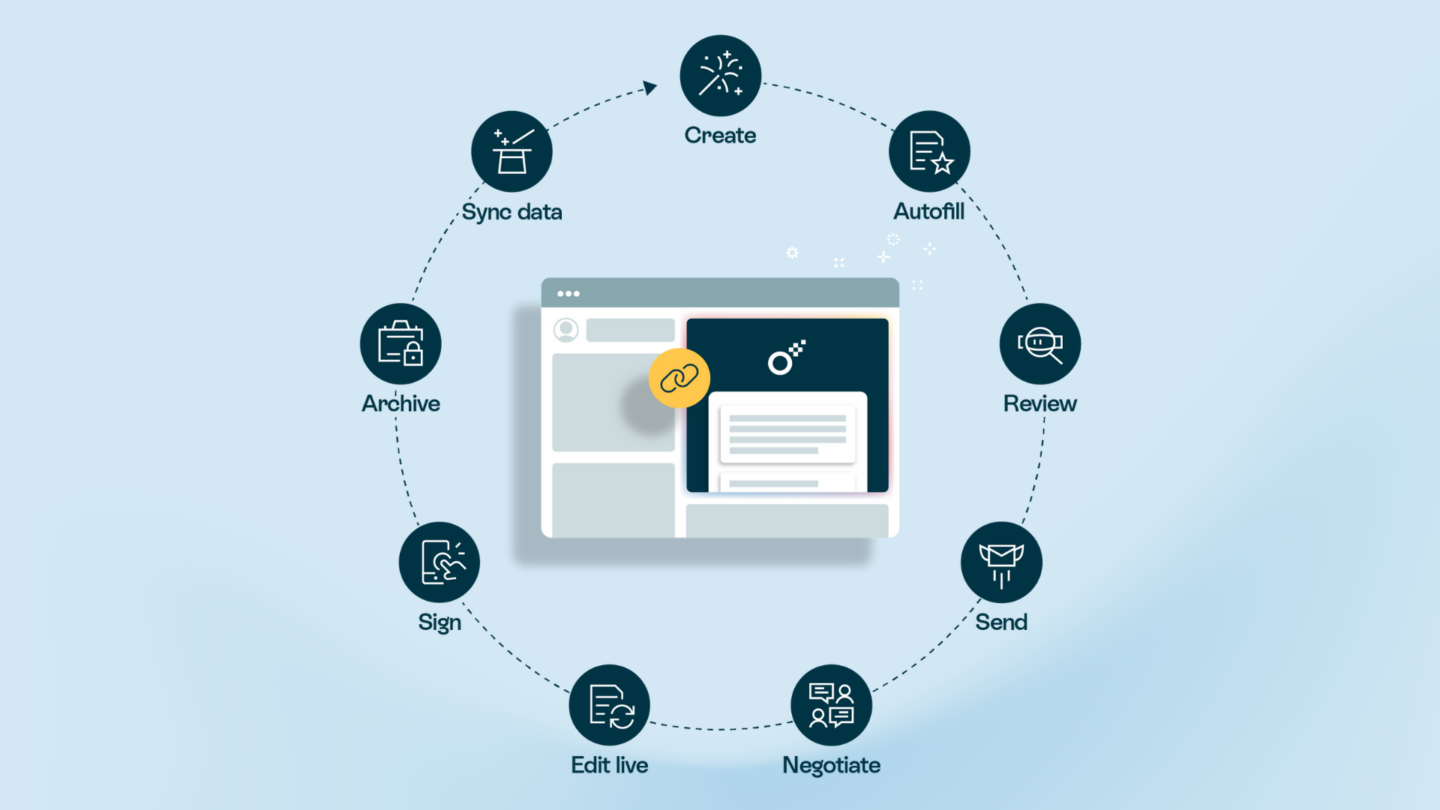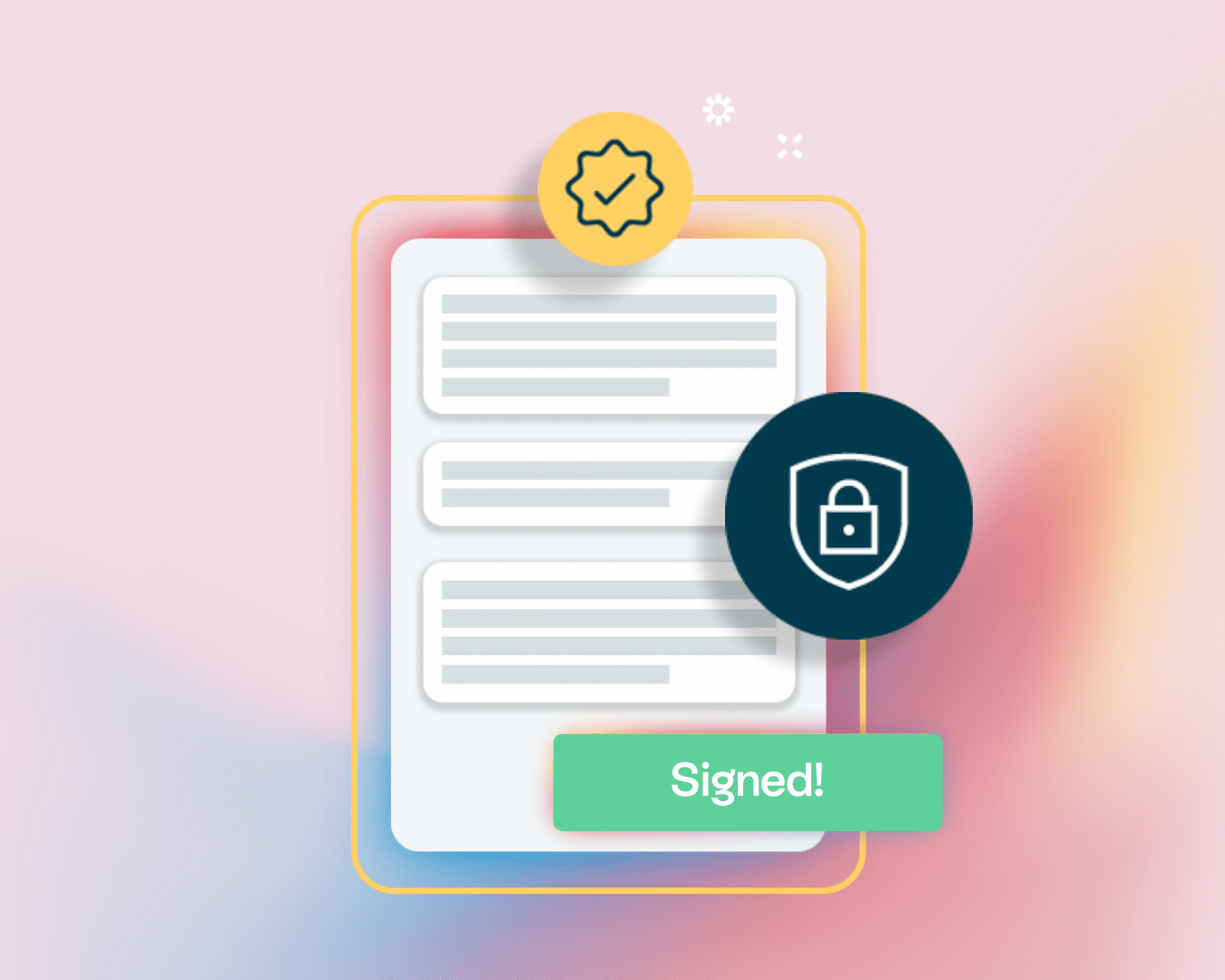Home > What is contract management? A complete guide
What is contract management? Your ultimate guide

Did you know that 90% of contracting professionals have difficulty finding the contract they need at a given time? Moreover, over four out of ten say they lack a defined process for storing documents after execution. These statistics clearly show how much businesses need to optimize their contract management.
After all, if there’s one thing that every business worldwide has in common, it’s that they use contracts. They may not always come to mind as a core part of your work, but they are everywhere – they regulate your relationships with customers, partners and employees. With a big enough business, effective contract management gets difficult without a dedicated software platform, but there are some things you can do to overcome this challenge.
In this article, I will share these tips and show a potential tool you can use. Read on to learn how to get the most out of your contract management!
See also: Contract creation: The only guide you need
What is contract management?
Contract management is the process of managing the agreements that you make with other parties – either individually or as a business. This process spans the contract lifecycle from pre-sign (before signing) to post-sign (after signing), covering the renewal, renegotiating, executing, complying, archiving and storing of contracts.
What do contract managers do?
Contract managers are specialists responsible for processing, managing, administering and optimizing all contract-related processes. They:
- Create contract templates and draft and review contracts
- Ensure documents reach the right people at the right time
- Store contracts and organize them in a way that makes them easily accessible
- Oversee digital contract software integrations and analytics
Contract management vs contract lifecycle management – what’s the difference?
Although the terms “contract management” and “contract lifecycle management (CLM)” are often used interchangeably, they have distinct meanings.
Contract lifecycle management is a more comprehensive approach, providing greater visibility and control over the contract lifecycle and the entire process of managing contracts. It can involve manual or a mix of manual, automated and hybrid processes. Contract management is more limited in scope, often focusing on post-execution obligations and compliance.
Here’s a table to summarize the differences between the two.
| Contract management | Contract lifecycle management | |
| Scope | Managing existing contracts | Managing the entire contract lifecycle |
| Processes | Compliance Renewals Obligations | Creation Negotiation Compliance Performance Renewal |
| Technology | Document storage Compliance tools | End-to-end contract lifecycle management software with workflow automation |
| Objectives | Risk mitigation Compliance | Value maximization Efficiency Strategic insights |
On the other hand, contract lifecycle management represents a more proactive approach.
To put it simply, contract management is for companies with simpler needs. It’s part of contract lifecycle management, which is more complex and provides a strategic, value-driven approach to managing contracts end-to-end.
Next-generation contract management software
Simple contract management has evolved to include automated workflows and other methods that facilitate contract automation. CM and CLM can both involve contract automation and innovative technologies, such as artificial intelligence and predictive analytics.
Manage your contracts easily with dedicated contract management software that includes contract automation capabilities – Oneflow. This platform provides businesses with a suite of powerful features, AI tools and integration options. Here’s what it offers:
- Oneflow AI – Import your existing contracts into Oneflow and review them (you can do this in bulk) to ensure compliance and identify issues and human errors. The platform also allows you to easily search for information on your contracts.
- E-signatures – Sign contracts with a legally binding e-signature that supports different methods (standard e-signature, SMS verification, electronic identification, handwritten signature).
- Management – Create workspaces with folders and customize them however you like. You can also set admin roles, configure reminders and lifecycle notifications, and more.
- Workspaces and collaboration – Organize your contracts using branded workspaces suited to your company’s workflows. The platform facilitates collaboration via audit trials, shared comments and video screen recordings. You can hide sections based on predefined triggers and rules.
- Dynamic templates – Create contracts and invite/notification messages faster with a wide selection of customizable templates you can share within or outside your workspace.
- Tracking – With Oneflow, you can track the signing process (and even before it begins!). You’ll know when someone opens the document (including the exact date and time). The platform will also track how many times someone looked at the agreement, which can be helpful in its own way (for example, if they opened it several times but didn’t sign yet, there might be an issue to resolve).
- Analysis – Monitor engagement (open rate, number of visitors) and other contract-related KPIs. Check our article to learn how to create an effective contract dashboard and get the most out of your data.
- Integrations – Oneflow offers various types of integrations. For example, you can handle contract management in Membrain or another CRM you choose (Salesforce, HubSpot etc.).
Interested in Oneflow? Sign up for our 14-day free trial or book a demo to see the platform’s features in action.
What are the stages of the contract management phases?
Contract management has three phases: pre-sign, sign and post-sign.
1. Pre-sign
Pre-sign means any steps that occur before signing, such as drafting the contract, collaborating on the content with internal and legal teams, negotiating terms, and more. During the pre-sign phase, you write or edit a contract and prepare it for signing. If it’s a digital contract, you can use a template and include all the required information.
The pre-sign stage isn’t just about a single contract, though. If your company uses contract management software, the pre-sign phase is also when you can set the groundwork for your team’s success. This can include setting up workspaces for your different teams with the relevant templates and tools for each team.
2. Sign
After that comes the phase everyone is familiar with: the signing. These days, it’s typically done via e-signing with an e-signature solution. Because of the pandemic, the acceptance and widespread use of e-signing has surged around the globe.
However, the signing process may not be straightforward, and sometimes contract negotiation may be required. Luckily, some contract management solutions like Oneflow let you comment with your counterparty within the contract and edit it after it’s been sent so that you can cut down the back and forth.

3. Post-sign
Post-sign includes any steps that occur after the contract is signed. The contract is now ready to be executed. This can include storing, archiving, organizing, managing renewals, deadlines, and more. Once the contract is signed, it’s archived inside your document storage. The post-sign phase of the contract management process requires oversight and administration, especially if your organization processes a large volume of contracts.
With a dedicated contract management platform, you can pull any agreement back up at any time to analyze it and send it for revisions, updates, renewals or even termination. A good tool should also make archiving easier with options like folders, tags, global search, and automatic internal reminders for when contracts need to be resigned.
See also: How to create an interactive PDF? and How to track changes in a PDF document?
Why is contract management important?
Managing your contracts is critical for any business for several reasons. It helps you reduce costs and risks, increase efficiency and make informed decisions.
Risk mitigation
Agreements often involve confidential details, financial commitments or generally sensitive information – which is why contract risk management is so important. With good management, organizations can keep track of their contracts, define user permissions to ensure documents never end up in the wrong hands and set up internal reminders never to miss contract deadlines.
Cost savings
Successful contract management can lead to significant cost savings. By actively monitoring contract performance and milestones, organizations can identify opportunities for cost reduction, such as renegotiating pricing, consolidating contracts or identifying underutilized services. Additionally, effective contract management helps prevent unnecessary penalties, fees and legal expenses. Faster processes for creating and managing contracts save your employees time so they can use this time to do what they do best.
Relationship management
Contracts often involve relationships with external parties, such as vendors, suppliers or clients. Effective contract management helps nurture these relationships by promoting clear communication, trust and transparency. It fosters a collaborative environment, reducing conflicts and establishing a foundation for long-term partnerships.
Enhanced efficiency and productivity
Contract management tasks – searching for contracts, tracking deadlines or managing renewals – can be time-consuming when done manually. You also risk errors. Implementing contract management systems and workflows streamlines these processes, automates tasks, and centralizes contract-related information. It improves efficiency, reduces administrative burdens and allows teams to focus on higher-value activities.
Data insights and decision-making
Contract management systems can provide valuable insights through analytics and reporting functionalities. Organizations can analyze contract data to identify trends, risks and opportunities. This information enables informed decision-making, such as identifying contract performance issues, optimizing supplier relationships or identifying areas for process improvement.
Consequences of poor contract management
Poor management of your contracts can have significant consequences for organizations, including legal, brand image, financial and compliance risks such as:
- Financial losses through overpayment or missed revenue opportunities
- Operational inefficiencies resulting in missed deadlines and decreased productivity
- Damaged relationships with stakeholders due to miscommunication or unmet expectations
- Missed opportunities for cost savings and business growth
- Disputes and non-compliance
- Uncertainty in both operations and legal matters
What does effective contract management look like?
You’ve got yourself a handy system. Your contracts are all in one place and more coordinated than ever before. But what does effective contract management look like?
In short, it means everyone in your company can easily find and access your contracts – be it to renew one or to check some details. They no longer have to bother anyone or spend hours searching through a contract database. Thanks to powerful search functions and a single source of truth, they can find what they need with just a few clicks. Beyond that, a contract management system also minimizes the risk of data breaches or accidental legal non-compliance by implementing controls with outgoing and incoming contracts.
When contract management is truly effective, it allows anyone at any organization to become a contract legend.
See also: How to master contract management with a contract playbook
Contract management best practices and tips
Here are a few tips for finding a contract management solution that works for your company.
A solution that works for everyone
Find a solution that fits not only you and your team but your entire organization so that all your contracts are in one place. This is especially important for auditing purposes.

Choose a contract management software that has organizational tools
Contract organization is necessary if you want to mitigate risk and reduce unnecessary admin time. Some software, like Oneflow, allows you to create different workspaces to keep your team’s templates, dashboards and archives separate.
Choose software that helps you stay on top of important contract lifecycle events
To ensure you never miss a contract deadline, pick a platform that allows you to set up internal reminders and lets users view upcoming contracts in a calendar view.
User permissions so contracts don’t get in the wrong hands
Seeing as all contracts include sensitive information, you should pick software with customizable user permissions that allow you to control who can access what (and what they can do with the information they have). In Oneflow, permissions settings are specific enough that one user can view certain teams’ documents and edit another team’s templates while being restricted from accessing a different set of templates.
Define your use cases
Different industries and departments have different needs. For example, requirements for effective contract management in healthcare differ slightly from what you want in contract management software for sales or contract management platforms for procurement. It’s generally a good idea to define your use case and then choose a platform that fits it best – unless you have a universal contract management platform like Oneflow that can be molded to fit any need.
Pick a contract management platform that can integrate with your other software
By integrating with your other software, you can cut down additional admin time and strengthen the data integrity of your existing tools. Oneflow integrates with dozens of CRM, ATS, recruitment and Power Apps so data can be auto-populated to and from your existing software.
So why not automate your contract management processes today?
Contracts define the rules we build our businesses upon – how we deal with our partners, customers, employees etc. – making them incredibly important. Managing them effectively is therefore essential, and – as with many other aspects of business in the 21st century – good software can help optimize this process.
A contract and obligation management tool such as Oneflow streamlines and optimizes the process of creating, negotiating and signing contracts. It’s easy to integrate with other systems (like Salesforce, HubSpot or Power Apps) and provides powerful features – including AI capabilities that allow you to automate repetitive tasks and generate insights. You can also configure reminders and access in-depth analytics.
Are you curious to see what Oneflow can do for your business? Book a demo today to learn more about our solution and get answers to any questions you might have! Or simply sign up and try the product with our 14-day free trial.
FAQs
Why should I use a contract management platform?
A contract management platform lets you control and manage all your contracts in one place. It’s a hub for all your contract-related activities, such as creating, sending, editing, storing and managing them.
Think of it as a CRM (Customer Relationship Management) platform – but for your contracts. In fact, good contract manager software can seamlessly integrate into your CRM, allowing you to handle your contracts inside the platform and streamline the management of your contracts even further.
An example of such a tool is Oneflow. It’s an automated contract management system that lets you create, edit, send, negotiate, sign and store your contracts in one place.
What industries uses contract management platforms?
Any department in any business, large or small, can use automated contract management systems. However, teams and departments that process a large volume of contracts benefit most, e.g.:
Sales
- Sales teams use contract management platforms to speed up their sales processes. By automating their contract creation and negotiation and integrated workflows with their CRM, sales teams can spend time selling instead of managing contracts.
HR
- With a contract management platform, HR teams can turn candidates into hires quickly. They can send out automated employment contracts and fully control all employee-related contracts.
Procurement
- Procurement teams get control over and speed up their long contract processes by using a contract management platform. It lets them shorten the time to sign and stay on top of contract lifecycles.
Legal
- Contract management platforms make life easier for legal teams. They ensure that only the latest version of a template is available and that contracts are easily accessible.
What is meant by contract management?
Contract management is the systematic process of creating, executing and analyzing contracts to maximize operational and financial performance and minimize risk. The process spans the entire contract lifecycle, including potential renegotiation, renewals and the contract’s archiving.
What are the four components of contract management?
Contract management includes the following steps:
- Contract creation and negotiation – defining and agreeing upon terms and then signing the contract.
- Execution – executing the contract and implementing its terms with adherence to the defined timelines and responsibilities.
- Compliance and monitoring – ensuring both parties follow the agreed-upon terms and regulations.
- Evaluation and relationship management – evaluating the terminated contract and building a long-lasting relationship with the parties who signed it.
Jump to section
Book a demo of Oneflow
Book a demo of Oneflow
"*" indicates required fields







